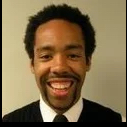
Aris Benjamin Winger
The way I think about how I arrived where I am mathematically has changed over the last few years. As little as two years ago, if I was asked “How did you get into mathematics?” I would say “I was always good at it.” I have a different and what I believe to be more accurate answer these days. Now I say “I was always valued in it.” What a difference.
Starting in the second grade, when I was winning two-digit multiplication battles at the board with my classmates, I was told I was good at math. In the fifth grade, we would race to do problems and I would beat the people who had better overall grades. I was told I was smart because of my grades in math in elementary school. When my father passed away and I moved to D.C. and a new school, my grades suffered, yet I felt comfortable in my math class, a place where I had always felt good and valued.
At this point, being “good at math” had become a part of my identity. By the time college came around and I had to pick a major, it was clear that math was the only place for me. So for the next decade at Howard University and Carnegie Mellon University I obtained my Bachelor’s, Master’s and Doctorate in Mathematics. For that ten year period from 1995 to 2005, Mathematics was the dominant part of my life. It is often the most overlooked part of my life as well.
When I tell people what I do, they say “Wow, you have one of those brains,” or “I just wouldn’t be able to do that.” or “You must be some kind of genius.” Two years ago, I used to bask in that type of fake superiority; I must be this good because everyone says so.
But in putting in the work of thinking about equity in mathematics and looking back on my life as clearly as I could without ego and some sense of maturity, I have come to some different conclusions. I arrived where I am mathematically because:
1. I felt loved and supported in the doing of mathematics early on
2. Given the chance, I spent a decade working on it so hard that it was the center of my life.
These may not be necessary requirements for someone to become a mathematician but what I want to impart is that these two conditions have nothing to do with me having some secret talent or innate gift at anything. In this sense I am fundamentally not special; I was fortunate enough to be given opportunities in mathematics and because I felt good about the subject and my place in it and because I committed to it then I became what I am.
This is a vital point we must understand. Mathematics is no more separate from the people than any other subject. We have made mathematics this subject that is disparate from the masses. We must undo this.
Curiously, when someone says they are a doctor, it is not looked upon with amazement compared to a resaponse of “I am a mathematician.” This may very well have something to do with the fact that we all know that doctors have to go through years and years of preparation to become experts in their field. No one has an innate gift at performing surgery; we know you have to be trained. Mathematicians have to do the same thing, but somehow we have some innate gift? This is wrong.
I am where I am because I had a passion for the subject that was cultivated through loving support, I was given opportunities in the subject and I used all of my talents to train for a solid decade at becoming as good as I could be in the subject. Period.
It is my belief that we all have within each of us the ability to reach our potential and destiny when we have those three elements. I also believe we are each powerful enough to change the narrative of our past to allow for these elements to appear in the present. We each have our own choice to find our passion. We can make moves to make connections and find opportunities. And most certainly, we always have the choice to decide how much effort we will commit. When everything around me says I cannot be successful in something I come back to these elements as a reminder of what I know I have in me and what I am convinced each of us has within themselves.
